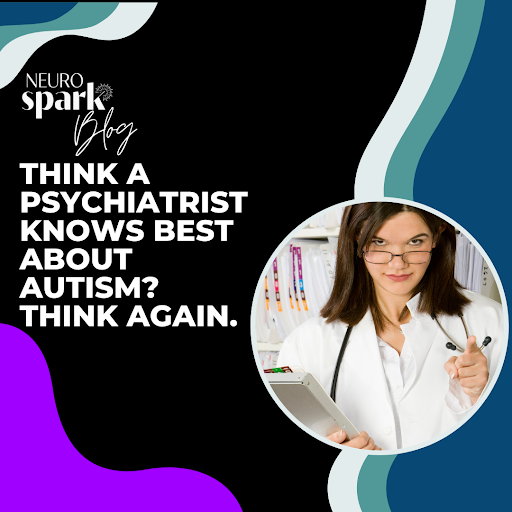
Autism is typically diagnosed in childhood, but many adults are now seeking assessments and diagnoses later in life. If you’re considering a formal evaluation, you might assume that a psychiatrist is the best option for an official diagnosis. After all, psychiatrists are medical doctors who specialize in mental health, right? Here’s the thing–while that may be true, the reality is that most psychiatrists are not adequately trained to assess autism in adults. In fact, many healthcare providers—psychiatrists included—lack the necessary education and experience to diagnose autism in adults properly. This gap in knowledge can lead to misdiagnoses, inadequate support, and a frustrating experience for those seeking clarity about their neurotype.
Why Finding the Right Professional for an Autism Diagnosis Matters
Lack of Autism Training in Medical Education
One of the biggest reasons psychiatrists are not the best choice for an adult autism assessment is that medical education does not prioritize neurodiversity. A small survey published last year found that only 16% of medical students had received formal training in neurodivergent conditions, and 97% expressed a desire for more education about neurodivergence. Without a solid understanding of adult autism, particularly those who have spent years masking their autistic traits, most psychiatrists simply don’t have the expertise necessary for an accurate diagnosis.
Other research found that only 25% of primary healthcare providers reported high confidence in their ability to communicate with autistic adults, identify their needs, and make necessary accommodations. If primary care providers and psychiatrists lack confidence in even communicating with autistic adults, how can we expect them to recognize the subtle signs of autism in adults, much less understand the unique challenges and barriers to diagnosis that people of color, LGBTQ, and gender-diverse folks face at disproportionate rates.
The Consequences of Inadequate Education on Autism
When physicians and psychiatrists are not adequately educated or trained in autism, the consequences can be devastating. Here are just a few of those issues:
Misdiagnosis: Many adults seeking autism testing were already misdiagnosed in the past. Conditions like anxiety, depression, bipolar disorder, or borderline personality disorder are often diagnosed instead of autism—often times inaccurately. A psychiatrist unfamiliar with adult autism (especially high-masking females, BIPOC, queer and trans, or PDA) might focus solely on what falls within their existing framework, rather than considering autism as a possibility.
Inappropriate Support: Without an accurate autism diagnosis, people receive support that does not fully address their needs. For example, medications might be prescribed to manage anxiety or depression, but without the understanding that these issues may be caused, or exacerbated by, unmet autistic needs or sensory overload, the real challenges aren’t addressed.
Dismissal and Gaslighting: Many autistic adults feel dismissed by medical and healthcare professionals who do not listen to their experiences or take their concerns seriously. If a psychiatrist does not recognize adult autism, they may tell clients that they are “overthinking things” or that their difficulties are just the result of a mental health condition. This kind of invalidation can be incredibly harmful and lead to feeling helpless and/or hopeless.
Lack of Accommodations: Without proper training, medical professionals may struggle to identify necessary accommodations for autistic clients. This can result in appointments that are overwhelming, inaccessible, or unhelpful.
Who Should You See for an Adult Autism Assessment?
Unlike most psychiatrists, autism specialists—such as psychologists and social workers—have actual expertise in the nuances of adult autism, and many also have lived-expeirence. They use adult-appropriate assessment measures and questionairres as part of a comprehensive autism evaluation that provides an understanding of how your brain works, awareness of your differences, your strengths, your needs, and all the unique aspects of who you are.
At NeuroSpark Health, our fully neurodivergent team has the expertise required to accurately diagnose autism in adults. We understand that seeking an assessment can be a deeply personal and sometimes overwhelming journey, and we are committed to making the process as affirming and accessible as possible.
The Bottom Line: Choose an Experienced Autism Specialist
If you are seeking an adult autism diagnosis, it’s important to choose a provider who specializes in adult autism. While psychiatrists are experienced with mental health conditions, most lack the necessary training to accurately diagnose autism in adults. And this knowledge gap leads to misdiagnoses, gaslighting, or unnecessary frustration.
By choosing a provider that specializes in adult autism assessments, you will know that your evaluation is conducted by someone who truly understands the nuances of neurodivergence. Even better? Choosing a provider who is also neurodivergent! If you’re ready to take the next step toward self-discovery, we’re here to help. You deserve specialized, nonjudgmental, neurodiversity-affirming care.
If you’d like to learn more about our autism assessment services, feel free to reach out to us at info@neurosparkhealth.com or visit our book a consultation link to get started.








